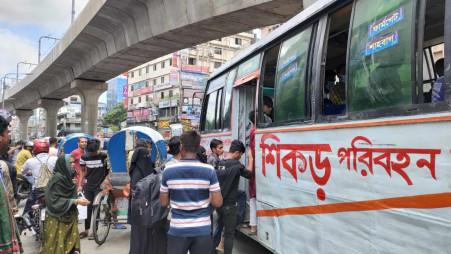#Interim government is struggling to restore order
#Non-cooperative attitude of bus owners
#Even new leader comes, old situation has not changed
Public transport cannot be brought in order. This situation is mainly due to the non-cooperation of the bus owners.
Although the previous government took the initiative of operating all buses under a company-based organization, it was not successful. The current interim government is also struggling to restore order in the public transport sector.
Bangladesh Road Transport Authority (BRTA) related sources know this information.
According to related sources, under the bus route rationalization project, the previous government had a plan to divide Dhaka into 42 routes and run buses under one company. In order for buses to stop and pick up passengers at specific locations, transport workers will have fixed working hours and monthly salaries. As a result, it was assumed that the unhealthy competition on the road would decrease. The current interim government has also held three meetings on bus route rationalization. But the situation did not improve. Despite the arrival of a new leader in the Transport Owners Association, the old situation has not changed. The leaders of the previous committee of the Dhaka Road Transport Owners Association asked the city corporation for a contribution of Tk one lakh per bus. The situation is still much the same.
According to sources, the 28th bus route rationalization meeting was held on September 12 at Nagar Bhaban of Dhaka South City Corporation. The demand of the transport owners in the meeting is the same as that of the previous leaders. A route permit will be obtained from the association and paid for. Transport leaders have also sought compensation for old buses and bank loan guarantees. Even the owners are threatening to stop plying the buses. In such a situation, the government will be strict if necessary. Running BRTC in empty space if required. Besides, letters are being given to various private institutions to run buses. The project will be successful with those who agree.
Sources also said that due to the passenger crisis, the privately owned buses gradually left the city transport. And BRTC continues to bear the burden of losses. BRTC has incurred a loss of around Tk 11 crore by running urban transport. The main reason behind the failure of urban transport is that private transport owners do not want to come under government institutions. They believe that apart from depriving them of the main profit, the control of the transport business will be reduced, and the opportunity for extortion will be closed. The opportunity to put pressure on the government in the name of sudden strike will also be lost.
Meanwhile, the experimental movement of bus route rationalization started from last December 2021. At that time, 382 buses of 13 routes including Rajnigandha, Malanch, Midline, City Link were plying on that route. Those buses were supposed to be removed by the next month i.e. January 31, 2022. But even in September 2024, no bus has moved. On the contrary, urban transport has moved away. But the buses of other private companies are running on the road, and the city transport buses have disappeared. In the beginning, it was possible to include the buses of a private company called Transsilva in the rationalization. In the face of losses, the bus company moved. Some buses of another company are plying in this process but they have deviated from the principle of rationalization.
21 and 26 routes are only nominally surviving depending on BRTC buses. Papers include 30 buses each on both routes. But in all 20 buses are not running. But a total of 100 buses are supposed to run on four routes. In this regard, BRTC chairman Tajul Islam said that BRTC has been making losses since the beginning. Other buses run on urban transport routes. BRTC buses have reduced due to lack of passengers. But not completely closed.
ZH






